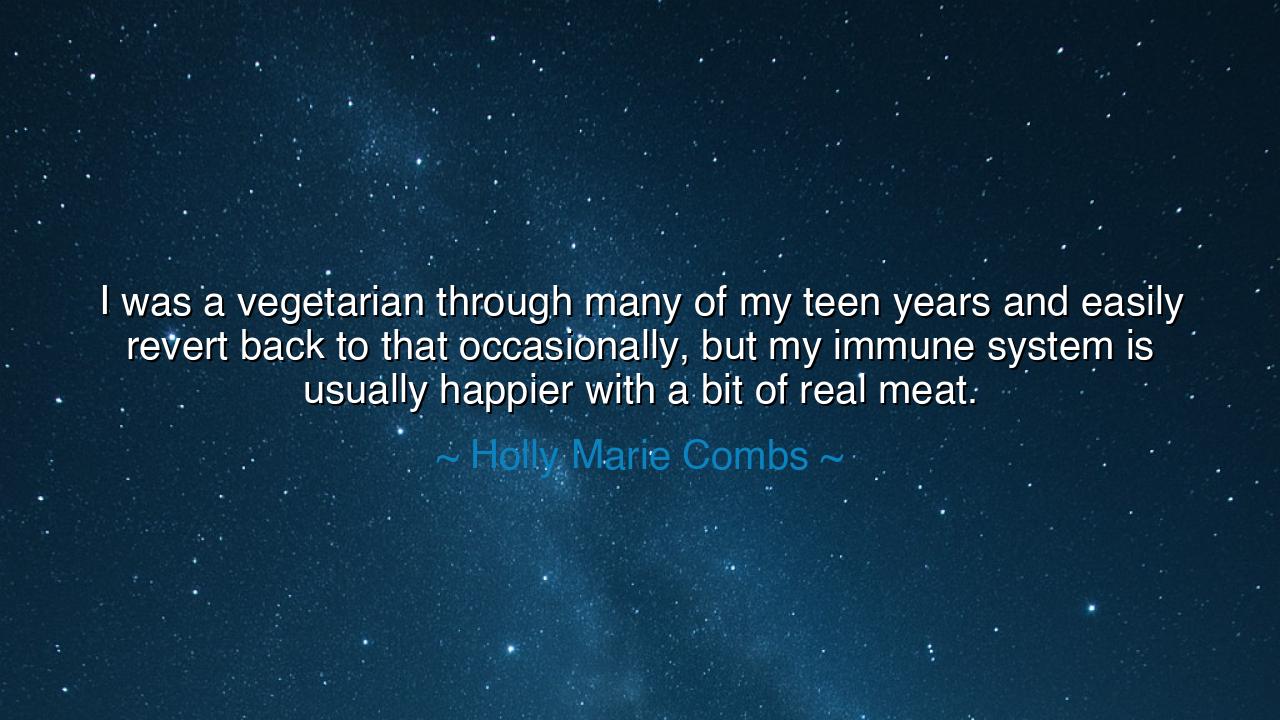
I was a vegetarian through many of my teen years and easily
I was a vegetarian through many of my teen years and easily revert back to that occasionally, but my immune system is usually happier with a bit of real meat.






Hearken, children of the ages, to the reflection of Holly Marie Combs, who speaks of the delicate balance between youthful choice and bodily wisdom: “I was a vegetarian through many of my teen years and easily revert back to that occasionally, but my immune system is usually happier with a bit of real meat.” In this confession lies the timeless tension between ideology and instinct, between what we aspire to embrace and what the body, in its ancient and knowing rhythms, requires. To tread the path of health is not solely to follow principle, but to heed the subtle language of the self, the whispers of immune strength and vitality.
The origin of this statement emerges from Combs’ own journey through adolescence, a period marked by exploration, experimentation, and questioning. In her teen years, she adopted vegetarianism, a choice often guided by ethics, compassion, or curiosity. Yet as time passed, she recognized the body’s primal needs, the ways in which nutrition sustains immunity and vigor. This oscillation between ideology and necessity reflects the eternal human challenge: to balance the aspirations of the mind with the wisdom of the body, a lesson recorded in every scroll and scripture across civilizations.
Consider the ancient teachings of Hippocrates, who counseled that food is medicine, and that balance, moderation, and attentiveness to the body’s signals are paramount. In societies across time, from the nomadic tribes who relied on hunted meats to sustain their strength, to the monastic communities who cultivated gardens yet carefully supplemented diets for health, humanity has always wrestled with the choices of nourishment. Combs’ reflection is a modern echo of this ancient wisdom, demonstrating that even conscious, ethical choices must harmonize with the pragmatic demands of life.
This quote also reveals a deeper truth about self-awareness and adaptation. The human body is a complex instrument, and its needs evolve with age, activity, and circumstance. Combs’ recognition that she can revert to vegetarianism at times, yet still honor the signals of her immune system, illustrates the virtue of flexibility, of listening to one’s own inner counsel rather than adhering rigidly to ideology. History offers similar lessons: Franklin D. Roosevelt, for example, adapted his diet to sustain strength through illness and immense responsibility, recognizing that survival and energy sometimes require pragmatic adjustments.
A real-world example can be seen in the practices of hunter-gatherer societies, where diets were never dogmatic but attuned to availability and bodily sustenance. While these peoples might abstain from certain foods for long periods due to scarcity or ritual, they understood the necessity of consuming nutrient-rich sources when needed to maintain vitality and resilience. Similarly, Combs’ oscillation between vegetarianism and meat consumption reflects a timeless principle: the wise individual balances principle with the body’s imperatives, honoring both conscience and corporeal need.
From this reflection, a lesson of enduring significance emerges: to live well, one must cultivate attunement to the self. Ideals and choices are noble, yet the body—temple of the soul—demands respect. To ignore its signals is to court weakness; to follow them blindly is to forfeit principle. The harmony of life requires a dialogue between mind and body, a continuous negotiation that nurtures health, conscience, and spirit in unison. Combs’ insight reminds us that wisdom is measured not by rigidity, but by responsiveness.
Practical guidance flows from this ancient truth: first, cultivate awareness of your own bodily needs, observing how different foods, routines, and practices affect your vitality. Second, embrace flexibility: allow your choices to shift with circumstance, always informed by attentive observation rather than mere habit. Third, respect both ethical and practical considerations, seeking ways to harmonize ideals with health. Fourth, educate yourself on the nutritional and energetic demands of your body, and act accordingly. Finally, remember that the true measure of wellness is balance, a continuous dance between principle, adaptation, and care.
Thus, let Holly Marie Combs’ words resonate across the corridors of time: the human spirit seeks ideals, yet the human body seeks sustenance. To honor both is the path of wisdom, the art of living fully, and the stewardship of self. In this, we find an eternal teaching: heed the whispers of the body, act with conscience, and cultivate a life in which health, choice, and virtue converge, for it is in this balance that the soul finds strength, clarity, and enduring vitality.






AAdministratorAdministrator
Welcome, honored guests. Please leave a comment, we will respond soon